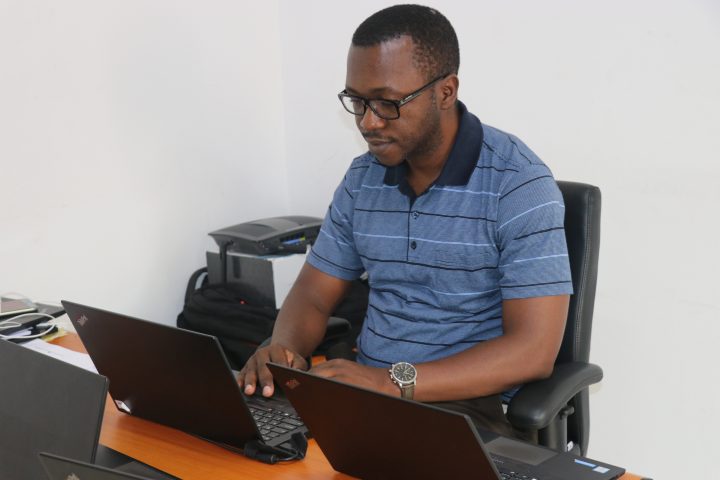Angola is the fifteenth country in Africa to roll-out PRIMES, UNHCR’s new Population Registration and Identity Management EcoSystem. Its centralized data base with case management modules (proGres v4), UNHCR’s cutting-edge Biometric Identity Management System (BIMS), and a newly developed Rapid Application (RApp) that allows for off-line registration are now used by registration officers throughout the country.
By Charlotte Arnaud and Omotola Akindipe

Registration team working on the field with the Rapp client, PRIMES offline component ©UNHCR/Omotola Akindipe
In March 2017, the outbreak of violence in the Kasai region of the Democratic Republic of the Congo (DRC) triggered the flight of about 35,000 new arrivals into Angola, now hosting a total of more than 70,000 refugees and asylum seekers.
Alessandro Telo, Senior Regional Registration Officer, was in Dundo in April 2017 to witness this influx of refugees. “For many refugees, the registration process is their first occasion to meet with UNHCR Staff. Their personal data is collected and recorded through individual interviews and photographs” Telo explain.
“For the first time in a UNHCR emergency operation, biometrics have been collected using BIMS, UNHCR’s Biometric Identity Management System, from the very beginning. It is an invaluable opportunity for the early identification, referral of vulnerable persons to available services, protection interventions and durable solutions, to avoid multiple registrations, and strengthen accountability in delivery of assistance”he adds.
Those data provide the basis for an effective and accurate protection and humanitarian response.
Recognized documentation contributes to ensure refugees’ freedom of movement, their security in a country of asylum and open a door to new opportunities to live in a dignified manner. This is why registration is amongst the top five priorities of the Africa Bureau.
In addition to BIMS, in July 2018 UNHCR deployed in Angola a new registration and case management online tool proGres v4 and an offline solution, the Rapid Application (RApp), which is built on Resco technology and integrates closely with proGres v4. Those tools are two core components of PRIMES, a suite of applications that provides a centralized repository of all relevant identity data of persons of concern, accessible from anywhere by UNHCR staff and partners with appropriate access rights.
PRIMES was designed to help the UN Refugee Agency deliver a faster and more efficient service to refugees.
When the emergency situation unfolded in Dundo, Lunda Norte Province, the UNHCR team faced the difficult challenge to register new arrivals while continuing individual case management activities in Luanda.
The registration team had to travel to the sites with the operation’s servers, making it difficult for the Luanda team to access the data of the other 44,000 refugees already registered in the system and residing in different locations, miles of kilometres from Lunda Norte Province.
The challenge of remote access to data now seems like a distant problem to Roland Djiodio, UNHCR registration officer.
“Now, PRIMES allows for the integration of all databases: the team in Luanda can work more independently and follow-up on cases and conduct protection interventions without requesting access from the Field Office in Dundo” he details.

Roland Djiodio managing the synchronisation of the Rapp client ©UNHCR/Omotola Akindipe
“With PRIMES there is a possibility for simultaneous online use at the office and offline use whilst in the field, with data being synchronized when back at the office. This has been very convenient because internet connectivity is definitely a challenge” Djiodio underlines. “The synchronization of Rapp is good. We had some bugs, but the team in Headquarters are working on an update to fix this” he adds.
Angola is one of the first countries were RApp is currently being piloted and the feedback from the field is crucial to improve the application and help UNHCR optimize the tool for further roll outs.
In July, a total of twenty staff and partners were trained on the new ecosystem and how to maximize its practice in Angola. The country is the eleventh to use PRIMES in the Southern Africa region and the fifty-first in the world.
The roll-out of PRIMES by the Regional Office is expected to be finalized in the region by the end of 2018 with the deployment of the ecosystem in Namibia.
